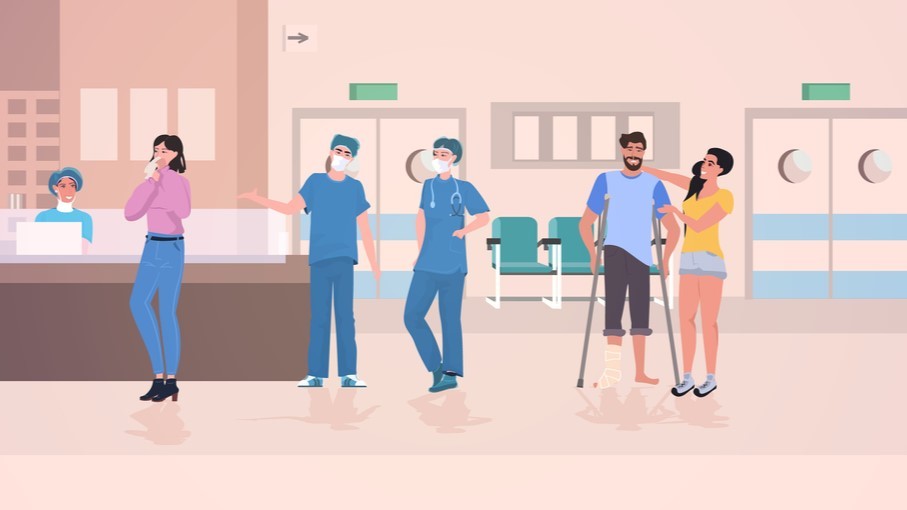Definition
Ambulatory refers to patients not occupying beds in hospitals or other inpatient settings, and to care given in physician’s offices, clinics, health centers, and other places where ambulatory patients usually go for their health.
- Emergency care. (it’s self-explanatory)
- Referral or tertiary care. (care beyond that of primary care)
- Primary care. ( most of the people use most of the time for their health problems)
Purpose Of Ambulatory Care Clinics:
- The need of the hospital to supplement its in-patient teaching program.
- The demand by the community, as well as professionals for comprehensive diagnostic and treatment centers.
- The new philosophy of hospitals- is to take a more active role in the community health program…
- The a need for the hospital and physicians to exercise greater control over patients receiving investigational use of drugs.
- The lack of a sufficient number of physicians in some areas thereby causing the population to travel to the medical center for comprehensive care. 6. The fact that emergency service is always available. Whereas physicians, in some rural areas, may not always be available.
With the aim of solving these situations, the American Pharmaceutical Association (APA) and the American Society of Hospital Pharmacists (ASHP) established a commission to study outpatient hospital pharmacy services and related hospital-community-pharmacy problems.
ASHP Statement On The Provision Of Pharmaceutical Services In Ambulatory Care Settings:
For increasing access to health care services, health care cost, and education to patients about medical attention.
To meet these needs, delivery of ambulatory health care is being created. Many of the activities outlined in the ASHP statements on clinical functions in institutional pharmacy practice have been adapted to a variety of ambulatory care settings including:
- Obtaining and documenting patient medication histories.
- Monitoring the safety and efficacy of the drug therapy through the maintenance of medication profiles.
- Providing the drug information to prescribers and other health care professionals.
- Assisting prescribes in the proper selection and adjustment of drug therapy through the application of pharmacokinetics and other principles.
- Identifying acute and chronic diseases and referring the other health care providers.
- Detecting and reporting ADR, interactions, and non-compliance patient behavior.
- Participating in drug-use reviews, patient care audits, and clinical drug investigations.
- Participating in the education of health care providers.
- Supervising the storage, preparation, dispensing, and administration of medications in the patient care area.
- Developing systems for the delivery of pharmacy services in the institutional and community.
ASHP recognizes and supports the development and implementation of ambulatory pharmaceutical services in an organized healthcare system.
ASHP Guidelines:
Minimum Standard For Ambulatory-Care Pharmaceutical Services:
Services to ambulatory patients are an important part of many institutional pharmacy programs. The essential elements of any ambulatory-care pharmaceutical services program are as follows.
- Ambulatory-care pharmaceutical services program directed by a pharmacist.
- Appropriate choice of drug and its storage, route of administration, and amount must be verified by the pharmacist. ( Maintenance of patient profile to prevent duplication).
- All medications dispensed to patients will be completely and correctly labeled and packaged according to standard regulations.
- Upon dispensing drugs to a patient, the pharmacist ensures for proper use of drugs.
- All drugs in ambulatory care service areas will be properly controlled.
ASHP believes that the above services must be followed without any exceptions.
ASHP Supplement Standard And Learning Objectives For Resident Training In Ambulatory Care Pharmacy Practice
A specialized residency in ambulatory care pharmacy practice must be organized and conducted to develop expert skills and areas of practice, differentiated scope, and depth of institutional pharmacy residents.
The objectives is training should include extensive service in clinical pharmacy services and management of drug distribution systems in ambulant patients.
- Qualification of the training site ( Meet the standard I in ASHP accreditation)
- Qualification of the pharmacy services ( Meet the standard II in ASHP accreditation)
- Qualification of the preceptor ( Meet the standard III in ASHP accreditation)
- Qualification of the applicant ( Meet the standard IV in ASHP accreditation)
Location of Patient Dispensing Area
There are set rules has the best area to locate a patient dispensing pharmacy. This is evidenced by the fact that in today’s practice.
- A separate outpatient pharmacy is available.
- A combined in-patient and outpatient you need the service provided from the same window.
- A combined in-patient and outpatient unit with service provided from a separate window.
Types Of Prescription Received
Depending upon the location and kind of hospital. The prescription received in the outpatient department pharmacy will generally include those of the private patient where permitted by the state board of registration in pharmacy. Indigent patients, non-indigent patients. Employees and patients being discharged from the hospital.
- Prescription call check used in the outpatient dispensing pharmacy has a means of matching the correct patient and prescription.
- Prescription blank was developed by the Children’s Hospital Medical Center in Boston.
- Combination prescription call check, prescription, and label, all in one form.
- Two-part prescription blank used in a prescription data survey
Make sure you also check our other amazing Article on: Ward Round Participation
